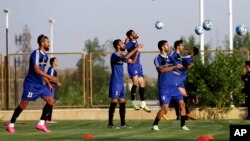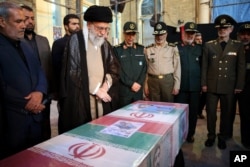In an apparent attempt to shape public opinion in favor of Tehran's involvement in Syria and Iraq, Iranian officials are encouraging athletes to highlight pictures of fallen Iranian soldiers.
Ali Alipour, a young and well-known soccer player who plays for the Tehran Derby Persepolis team, pulled up his jersey to show a photo of a fallen Iranian commander when celebrating a goal he scored in a match played during the Iranian New Year holiday known as Norooz.
Soccer players of major leagues are encouraged to wear shirts with printed images of fallen soldiers in Iraq and Syria more often, observers said.
"After January’s uprising, which was stirred by economic reasons but turned into a protest against Tehran's military involvement in Syria, authorities are using all possible means to gain more public support for their ambition in the region," Shahab Bahmani, an Iranian sports reporter, told VOA. "This is the major reason that they focus on sports fields and athletics."
Nationwide protests in Iran in early January, which started over price hikes for eggs and meat, turned into an unexpected display of opposition to Iran's multifaceted support for Syrian President Bashar al-Assad. Annoyed protesters chanted: "Don’t waste our money in Syria. Think about us."
Since 2011, Iran has been a major backer of the Assad-led Syrian government in its war against rebel groups and has supported Iraqi forces against Islamic State and other Sunni insurgents since the emergence of the extremist terror group.
'Shrine Defenders’
Iranian officials have asked the athletes to highlight photos of the “Shrine Defenders,” a term Tehran uses for its fighters stationed in Syria.
Soccer players of Tehran Persepolis displayed images of fallen fighter Mohsen Hojaji printed on fans’ jerseys and honored him in two of their major matches last year.
Hojaji was a member of Iran's Islamic Revolutionary Guards Corps who was beheaded by IS militants in September. A short video clip of his capture and beheading went viral in Persian social media.
FIFA, soccer’s governing body, prohibits the use of commercial, political and religious symbols in stadiums and sports events, but Iranian authorities appear to disregard this rule. Sports have been intertwined with politics in Iran, analysts believe.
“Many of the sports authorities are either politicians themselves or have close ties within the corridors of power,” said Mehdi Rostampour, a Denmark-based sports analyst and former sports anchor. “This makes them unresponsive to international institutes and more indulgent to the politics and political trends inside the country.”
Iranian teams and athletes have been severely fined in the past by various international foundations for ignoring many of these codes. FIFA fined Iran about $46,000 after fans were asked by authorities to sing religious chants at a World Cup qualifier against South Korea in 2016.
“In some cases, team managers or coaches are forced or forcefully recommended by higher authorities to ask fans, athletes or team members to behave, or act in a certain way,” said a member of the technical team at Iran’s football federation, who spoke to VOA on condition of anonymity.
“In most cases, not following such guidelines by the authorities [has] negative consequences for the athletes,” he added.

